Georg M. Holfelder

International Research Training Group 'Temporalities of Future in Latin America'
PhD Candidate
Political Science
PhD Project: "Anti-Press Violence and the Democratic State. Institutionalising the Protection of Journalists in Mexico"
Education
|
05/2019 – 08/2022 |
PhD Candidate, International Research Training Group ‘Temporalities of Future’ |
|
10/2014 – 02/2019 |
Master of Arts in Interdisciplinary Latin American Studies, Freie Universität Berlin |
|
09/2006 – 08/2007 |
Studies with ERASMUS in Spanish Philology, Universitat de Barcelona |
|
09/2003 – 08/2011 |
Magister Studies in Romance Literature, Economics and Social Anthropology, Ruprecht-Karls-Universität Heidelberg |
Work Experience
|
05/2019 – 04/2022 |
Researcher, International Research Training Group ‘Temporalities of Future’ |
|
10/2018 – 04/2019 |
Student Assistant, Institute for Latin American Studies, Department of Political Science, Freie Universität Berlin |
|
09/2017 – 12/2018 |
Freelance Student Assistant, International Research Training Group ‘Entre Espacios’, Freie Universität Berlin |
|
05/2017 – 09/2018 |
Freelance Student Assistant, German-Colombian Peace Institute CAPAZ, Freie Universität Berlin |
|
10/2015 – 03/2016 |
Intership, desiguALdades.net Research Network, Freie Universität Berlin |
|
05/2015 – 03/2017 |
Student Assistant, Centre for Rural Development, Humboldt-Universität zu Berlin |
|
04/2014 – 09/2014 |
Assistant Manager, Fräulein Burger GmbH, Berlin |
|
10/2013 – 03/2014 |
Product Manager, deinPhone GmbH, Berlin |
|
11/2012 – 06/2013 |
Internship, Drieschner Media GmbH, Berlin |
|
01/2012 – 04/2012 |
Internship, Sports For Development, Santa Marta |
|
08/2011 – 12/2011 |
Internship, regioactive.de, Mannheim |
PhD Project: "Fatal News. Anti-Press Violence and the Regulation of Information Flows towards the Mexican Public"
Supervisor: Prof. Dr. Marianne Braig, Freie Universität Berlin
In Mexico, violent attacks on journalists are increasingly threatening Freedom of Expression and the Right to Information, thus jeopardizing a central pillar of liberal democracy: Press Freedom. While anti-press violence as a socio-political phenomenon has been present throughout the country's recent history, it intensified throughout the 1990s before reaching unprecedented levels in the first decade of the new millennium. During the same period, Mexico's socio-political system underwent a profound transformation. On the one hand, the year 2000 marked the end of the PRI’s 71 years of one-party rule - a process often described the democratization of one of the oldest and most stable authoritarian regimes on the globe. However, the new millennium also saw escalation of the War on Drugs and the militarisation of public security. But while it seems that in Mexico's democratic transition was accompanied by the intensification of threats, attacks, and even the murder of journalists because of their work deeply authoritarian practices - subsequent governments also created an increasingly comprehensive institutional framework for the protection of journalists. Today, this framework consists of the National Human Rights Commission (CNDH) and its Programme for Offenses Against Journalists, the Special Prosecutors Office for the Attention to Crimes Against Freedom of Expression (FEADLE), and the Mechanism for the Protection of Human Rights Defenders and Journalists (the Mechanism). However, anti-press violence still intensifying and the Press Freedom as a crucial dimension of liberal democracy increasingly under attack.
This research project analyses the institutionalisation of Mexico's framework for the protection of journalists in the context of increasing attacks against the media. It addresses the question how the conflicting trajectories of increasing anti-press violence and institutionalising the protection of journalists can be explained in the context of democratisation. The data set is constructed through a qualitative content analysis of the different documents which contain the formal rules that establish the legal basis of these institutions. Based on this data set, the statutory goals of the individual institutions are identified and then analysed regarding how they link the institutional practice of protecting of journalists with aspirations towards a democratic future. Furthermore, the implementation of these statutory goals is analysed based a second data set which is constructed out of the annual reports of the three institutions about their own work, as well as by triangulation with reports on anti-press violence in Mexico by NGOs and IOs. Both data sets are complimented by semi-structured interviews with representatives from the CNDH, the FEADLE, and the Mechanism as well as from NGOs and IOs.


